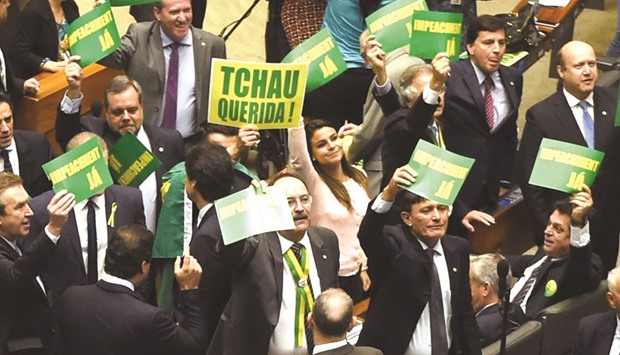Brazil’s President Dilma Rousseff fought yesterday for her political life, lobbying lawmakers to defeat a looming impeachment vote while lashing out at “corrupt” critics seeking to oust her.
On the eve of the vote in the lower house of Congress, the 68-year-old leftist leader published a searing column reaffirming her belief that she was the victim of a “coup.”
“They want to convict an innocent woman and save the corrupt,” Rousseff wrote in the daily Folha de Sao Paulo.
The political crisis is threatening to destabilise Latin America’s biggest economy as it struggles through a crippling recession and prepares to host the Rio Olympics in four months.
Rousseff had planned to address supporters camped out at the Mane Garrincha stadium in Brasilia yesterday, but she cancelled her appearance in order to press her case with legislators.
“She will stay (at her official residence) for the last negotiations for Sunday’s vote,” a presidential adviser told AFP.
Organisers hope that more than 100,000 will gather at the rally and the support camp this weekend.
“We came to join the defence of democracy and the government that was legitimately elected in 2014,” said Tiago Almeida, 35, a metal worker from the state of Sao Paulo who has been at the camp for days.
Rousseff’s opponents also plan rallies over the weekend.
Police tightly guarded the area around Congress, which was surrounded with metal barriers.
Pro- and anti-Rousseff rallies are also planned in other cities today, including the economic capital Sao Paulo and Rio de Janeiro, where the Summer Olympics will be held in August.
Lower house lawmakers yesterday debated the impeachment and are to vote today on whether to call for an impeachment trial.
Rousseff faces charges that she illegally used creative accounting to mask government shortfalls during her 2014 re-election.
She accepts the accusations but defends her behaviour by saying that previous governments used similar measures.
In a rowdy opening session on Friday, the government’s top lawyer Jose Eduardo Cardozo drew noisy complaints when he repeated Rousseff’s claim that the impeachment drive was a coup.
Cardozo said the government was considering further legal appeals.
“This is a historic process, there’s no doubt,” said House Speaker Eduardo Cunha, one of the leaders of the push to remove Rousseff.
Cunha has his own problems: he has been charged with taking millions of dollars in bribes linked to a massive embezzlement cartel centred on state oil company Petrobras. He also allegedly hid the money in Swiss bank accounts.
The pro-impeachment camp appears to have the two-thirds majority - 342 out of 513 votes - needed to pass the impeachment motion up to the Senate, according to a tally by Brazilian newspapers.
If that happens, Rousseff will be sent to trial in the Senate in a process expected to last months.
“The government will fight until the last minute... to foil this coup attempt,” Rousseff vowed on Thursday.
The president’s governing coalition has been crumbling, starting with the defection of Vice President Michel Temer’s PMDB party.
“We have come to a decisive phase in this process and the best thing for the country is to have a result on Sunday, whatever it might be,” said Leonardo Picciani, PMDB congressional leader.
“We have to turn the page and not waste more time in political battles and disputes,” he told AFP.
Temer will become interim president if the trial starts in the Senate, and Rousseff would have to step down for six months during the proceedings.
If the Senate then voted by a two-thirds majority to impeach her, she would be ousted and Temer would remain president for the rest of the term - until 2018.
Opposition lawmaker Paulinho da Forca told reporters Friday she had already been discussing “the future government” with “president” Temer.
Meanwhile, Rousseff’s top ally and predecessor as president, Luiz Inacio Lula da Silva, rallied support for her in a video message.
“We are going to defeat impeachment and end this crisis once and for all,” he said.
Lula also faces corruption allegations linked to the graft scandal at state oil company Petrobras.
Rousseff got support Friday from the visiting head of the Organization of American States, Luis Almagro.
The OAS “has made a detailed analysis of the impeachment process against Dilma, and has concluded that it does not fit within the rules that govern this process,” Almagro said.
“There is no criminal accusation against the president, rather she has been accused of the poor administration of public resources in 2014. This is an accusation that is political in character, and that does not merit an impeachment process.”
The Uruguayan diplomat said that there was concern over the fate of the most populous democracy in Latin America.
“Brazil has always been an example of democracy in the Hemisphere, and we all need for it to continue to be so,” he told reporters after meeting with Rousseff.

Deputies hold signs reading u201cImpeachment nowu201d and u201cBye darlingu201d during a session of the lower house of the Brazilian Congress in Brasilia yesterday.
